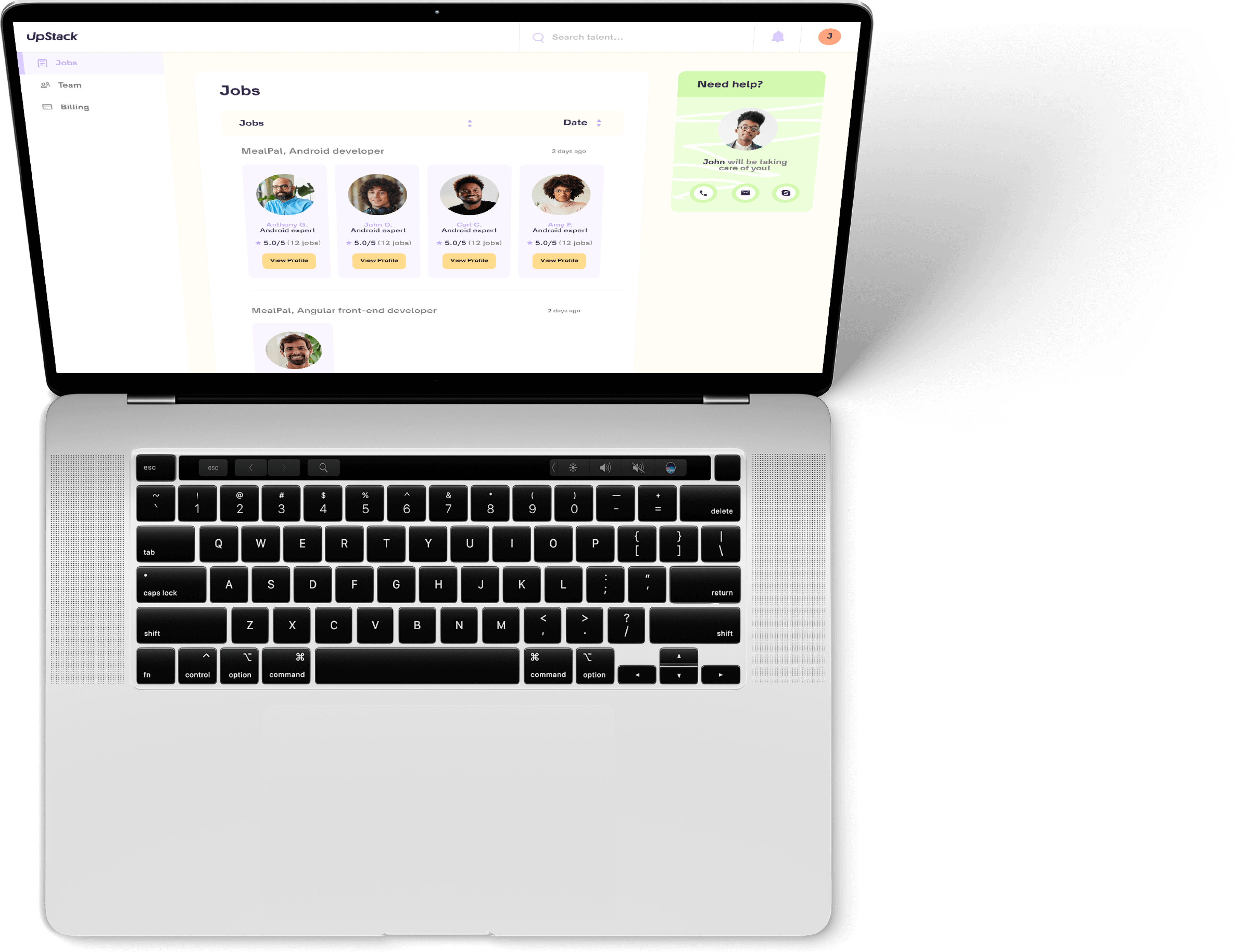


Schedule a consultation and Hire a Java Developer
Stella B.
Available
Java Developer
-
Experienced Java engineer with seamless project implementation
-
Loves guacamole & hates spoilers

-
Marcus T.
Available
Java Engineer
-
Stacked portfolio of beautiful, functional websites
-
Known for his epic charcuterie & cheese boards

-
David M.
Available
Mobile Java Developer
-
Mobile engineering guru with a knack for translating stakeholder needs
-
Would rather be diving Palau’s Blue Corner

-
Top UpStack Java Developers
Hire Java Developers with Upstack
When it comes to the demand of software engineers, the hottest skills you can get right now are Java and Kotlin. With these two programming languages, your company can reduce costs and find new ways to reach users with your applications. The demand for developers skilled in Java is growing rapidly, with many industries beginning to adopt new software solutions built on this platform. Whether you’re looking for a long-term partner or a freelancer who can work on a project basis, hiring a Java developer might be your best bet. To find the right talent for your team, here are some tips on how to hire the best candidate as a Java Developer for your company:
Hiring the Right Java Developers
It’s crucial when hiring a new employee to make sure the person is a good fit for the organization. This applies to hiring Java developers in particular because their work affects the company’s bottom line. If you select the wrong person for the job, it can result in big losses for your organization. When hiring a Java developer, consider the candidate’s areas of expertise, skill level, and education, UpStack will help you with all of this. This information can help you determine if the person is qualified for the job. It’s also important to consider the candidate’s personality. For example, does he or she have the right personality traits to work well on your team? Also, are his communication skills strong enough to work well with other team members?
Look for Testers and Reviewers
When searching for the right Java programmer, you should consider the person’s experience with the type of software you’re creating. If you’re hiring someone to create a piece of software from scratch, then it’s best to hire a person who has experience in creating software. On the other hand, if you’re looking for someone to review an existing piece of software, then it’s best to hire a person who has experience testing and reviewing software. Testing software is slightly different than creating it. For example, when testing, a developer might need to look for bugs or issues in existing software. Reviewing software, on the other hand, is a little more subjective. For example, a reviewer might provide feedback based on user experience.
Don’t Hire on Only Skillset
While it’s important to consider the candidate’s skillset, it’s also essential to consider the candidate’s personality. As previously mentioned, it’s essential to make sure the candidate has the right personality for the job. It’s also important to consider the developers communication skills. After all, communication is key in any workplace. It’s essential for employees to be able to effectively communicate with each other. It’s not just communication with co-workers that matters either. It’s also important to consider the candidate’s communication with clients. After all, the programmer you hire might need to work with clients on a regular basis.
Look for Cultural Fit
When hiring a java programmer, it’s important to keep in mind the company’s culture. It’s essential to select a programmer who fits the company’s culture. After all, a person who doesn’t fit in with the company’s culture might not last long on the job. This can be costly for a company because it might have to go through the hiring process again and again. Fortunately, many companies use surveys to help determine a candidate’s cultural fit. Surveys can help you determine which candidates have the highest cultural fit with your company. Of course, hiring a person who has a high cultural fit doesn’t mean that person will automatically be a good fit for the team. Instead, hiring an engineer who has a high cultural fit means this person has a chance to be a good fit for the company.
Don’t Forget About Company Culture
When you hire a java developer, it’s important to ask about the candidate’s work history. There are a few questions you might want to ask on a standard interview questionnaire, such as “What are your strengths and weaknesses?”, “Where do you see yourself in five years?”, and “What do you like to do in your free time?”. Asking these questions can help you determine if the candidate has a strong work ethic and if they’re interested in growing within the company. It can also help you determine if the person has a good work-life balance, which is something employers look for in candidates. Additionally, asking these questions can help you determine if the person has any connections to your company. After all, company culture can be a tricky thing to navigate. You want to find employees who fit in with the company’s culture while also adding something new to the team.
Conclusion
Hiring a Java developer might be the best decision for your company. The demand for Java developers is growing as new software solutions are created. If you’re hiring for a Java development position, make sure you’re looking for the right talent. This includes looking for testers and reviewers, not hiring on only skillset, looking for cultural fit, and not forgetting about company culture. By taking these tips into consideration, you can increase your chances of hiring the best Java developer for your company. Let UpStack guide you quickly through the developer hiring process.
They trust us
Why hire a Java developer with Upstack
![Java Developer and Programmer Icon]()
Top Java talent pre-vetted for a perfect fit.
Our 8-point assessment evaluation ensures that every senior Java developer you interview exceeds expectations across technical, cultural, and language criteria.
![Java Programmers Computer Icon]()
Hire reliable, passionate Java developers.
From late-night sprints to jumping on a last-minute face-to-face, we ensure that your recruits are down to get the job done right.
![Java Programmers High Five Icon]()
Risk-free 14-day trial.
Confidently onboard candidates with our no-questions-asked trial period. We’ll walk you through the contract-to-hire process if and when you’re ready to make it permanent with your new Java engineer.
![Java Computer Programmer Icon]()
Our Client Success Experts provide white-glove service.
Stay laser-focused on your business goals while our team of experts curates potential candidates and manages seamless programmer onboarding.
![Java Developer Writing Notes Icon]()
Build your optimal team confidently, quickly.
UpStack handles everything including background and reference checks, legal issues, and more. Our platform streamlines billing, timesheets, and payment all in one easy-to-access place.
Schedule a call with a Client Success Expert to get starting hiring a Java developer.
Start hiring Start hiring Start hiring
Hire from the Best.
Working with our Client Success Experts, we’ll help you build the remote team of your dreams with top Java talent from around the world.
Pre-vetted, reliable Java developers are standing by. Learn more about us and why UpStack is the perfect toptal alternative.





Explore our FAQ about hiring a Java Developer
How much does it cost to hire a Java developer?
UpStack has a simple billing model where each Java developer has a standard hourly rate averaging between $65-$75 per hour. Rates are based on skills, knowledge, and experience, and our developers are available mainly for full-time engagement (40 hours per week) and the occasional part-time opportunity (20 hours per week).
What is the process to find a Java developer?
You’ll connect with an UpStack Client Success Manager to determine your immediate needs. Our team uses a combination of AI and personal assessment to short-list candidates that match your job requirements. From there, you interview, select, and onboard the perfect developer, all within days of your initial call.
How does UpStack find its Java developers?
UpStack’s talent recruitment team connects with software developers around the globe every day. Each Java programmer is vetted for technical, communication, and other soft skills necessary for a developer to successfully work with your team. Once vetted, the candidates are accepted into the UpStack developer community.
How is UpStack different from an agency or recruiter?
UpStack's community of available, pre-vetted engineering talent means minimizing roadblocks to scaling your team effectively, efficiently, and immediately. Our Client Success Experts work with you and your UpStack developer to ensure a smooth and seamless engagement.
Can I hire UpStack Java developers directly?
Yes, you can hire UpStack Java developers at any time, and with the same assurance of smoothly on boarding talent risk-free. First, we’d create a job opening on our portal. Then, we’d vet, interview, and match developers that meet your needs. If you’re satisfied at the end of the 14-day trial period, at any time you can directly hire them.
How to Hire the Top Java Developer
To hire the best Java developer for your project or team, you need to make sure they have the ability to solve complex issues using java. We suggest asking the prospective developer questions about how they would solve specific problems. For example a experienced java developer should be able to call a method in Java. Read below to learn what it means to call a method in Java.
Before delving into how methods can be created, there is a need to understand the meaning of methods. A method is a block of code that is executed only when called. You can put data called parameters into the pattern. Methods are used to perform specific operations and are also called functions. It is generally used because it offers code reuse, which means it is written once and used at different times. It also offers simple changes. Each method features a unique name you can use when calling them. After reading the method name through the compiler, the method is called, and the specified task is performed. In this article, you will learn how to call predefined, custom (user-defined), static, and abstract methods in Java.
Calling Static Method in Java
In Java, a static method is a method that is called or invoked without a need to create a class object that defines the method. In addition, we can create static methods by putting the static keyword ahead of the method name. We can also create static methods using the static keyword before the method name. We can use ClassName.methodName to call static methods. The best illustration for a static method is the main() method. You can call it without object creation. In the code below, the static method of the Math class has been called. It is known as min(), and it returns at least the value of two numbers.
StaticMethodCallExample.java
import java.util.*;
public class StaticMethodCallExample {
public static void main(String args[]) {
int a;
//calling static method of the Math class
a = Math.min(40,98);
System.out.println("Minimum number is: " + a);
}
}Output: The minimum number is 40.
Calling the Pre-Defined Method in Java
Pre-defined methods are methods that have been defined already in the classes. When you need any pre-defined methods, you can just call its name. In the illustration below, a class object called hashCode() was used. In the following example, we have used a method named hashCode() of the class Object. To call the hashCode () predefined method, we create an object obj for the object class because it is an Object class method. When we use an object, we called the hashCode() method, which returns the value of the hash code for the object.
PredefinedMethodCallExample.java
public class PredefinedMethodCallExample {
public static void main(String[] args) {
int a;
Object obj=new Object();
a=obj.hashCode();
System.out.println("Hash Code of the object is: "+a);
}
}Output: Hash Code of the object is: 2036368507
Calling User-Defined Method in Java
To call a custom (user-defined) method, we first create a method and then call it. You must create a method in the class with parentheses () after the method name. The definition of a method consists of the header and body of the method. You can call a method using the commands below.
method_name(); //non static method calling
If the method is a static method, use the command below:
obj.method_name(); //static method calling
Where obj is the object of the class. In the illustration below, two user-defined methods were created; showMessage() and displayMessage(). They are both static (showMessage()) and non-static method (displayMessage()). You should also note that the showMessage() method was called directly without an object. And the displayMessage() method is called through the class object.
MethodCallExample.java
public class MethodCallExample {
//user-defined static method
static void showMessage() {
System.out.println("The static method invoked.");
}
//user-defined non-static method
void displayMessage() {
System.out.println("Non-static method invoked.");
}
public static void main(String[] args) {
//calling static method without using the object
showMessage(); //called method
//creating an object of the class
MethodCallExample me=new MethodCallExample();
//calling non-static method
me.displayMessage(); //called method
}
}Output: The static method invoked. Non-static method invoked.
It can happen that we have a class with methods that has the same name. So, how do we call two methods that have the same name? If a class with the same name has two or more methods, a distinction is made using the return type, parameter type, or a number of parameters. This concept is known as method overloading.
int sum(int x, int y); double sum(double x, double y);
The two methods above contain the same name as sum() but are different. The first sum() returns an int value and parses two parameters which are integers x and y. At the same time, the second sum() returns a double value and parses two parameters which are two double values, a and y. The program below overloads sub() method
MethodOverloadingExample.java
public class MethodOverloadingExample {
static int sub(int x, int y) {
return x - y;
}
static double sub(double x, double y) {
return x - y;
}
public static void main(String[] args) {
int a = sub(50, 20);
double b = sub(45.42,20.7);
System.out.println("subtraction of integer values: " +a);
System.out.println("subtraction of double values: " +b);
}
}Output: Subtraction of integer values: 30. Subtraction of double values: 24.720000000000002
Calling Abstract Method in Java
An Abstract method is a method that has an abstract keyword declaration. An abstract method has only one method declaration. Abstract body method defined in another class. The abstract methods must be stated in abstract classes. We can define the visibility of abstract methods as private or public methods. Abstract methods cannot be declared as final as that outweighs the benefits of abstract methods. The actual application of the abstract method must be in the subclass. The abstract method can be defined as follows:
abstract public void findArea();
Let us create a program that calls the abstract method. In the example below, we create a class called AbstractMethodExample, which is declared as an abstract class. In this class, we declare an abstract method called show(). Next, we create another class called AbstractMethodCalling, which is an extension of the AbstractMethodExample class. In this class, abstract methods are being implemented. We created a parent class and invoked the abstract method to call the show().
AbstractMethodCalling.java
//abstract class
abstract class AbstractMethodExample {
//abstract method declaration
abstract void show();
}
public class AbstractMethodCalling extends AbstractMethodExample {
//abstract method implementation
void show() {
System.out.println("The abstract method called.");
}
public static void main(String args[]) {
AbstractMethodExample obj = new AbstractMethodCalling();
//calling abstract method
obj.show();
}
}Output: The abstract method is called.















